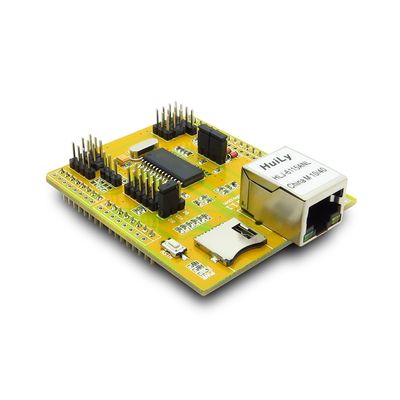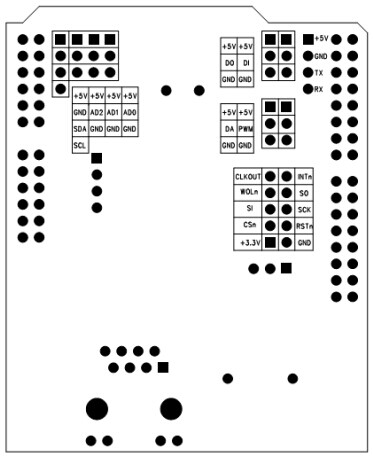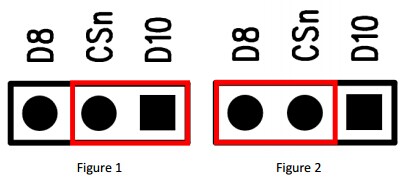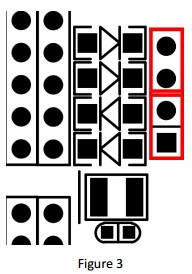Difference between revisions of "IE shield"
(→Features) |
m (→Overview) |
||
| (10 intermediate revisions by one other user not shown) | |||
| Line 1: | Line 1: | ||
==Overview== | ==Overview== | ||
| + | |||
| + | [[File:IEshield.jpg|thumb|400px|right]] | ||
IE [[shield]] is an Ethernet [[Shield]] instantly enables internet connectivity for Arduino projects with ethernet controller ENC28J60. Just stack it onto an Arduino to create your own networked devices. Easily check connection status with on board indicator lights. Extend your design further with many Electronic / Sensor brick interface and an TF card socket. | IE [[shield]] is an Ethernet [[Shield]] instantly enables internet connectivity for Arduino projects with ethernet controller ENC28J60. Just stack it onto an Arduino to create your own networked devices. Easily check connection status with on board indicator lights. Extend your design further with many Electronic / Sensor brick interface and an TF card socket. | ||
| − | This Ethernet [[shield]] support the POE function, you can | + | This Ethernet [[shield]] support the POE function, you can use the twisted-pair to power it and the Arduino board below, instead using the USB prower or external power jack supply. If your router or moden don't support POE, then you can use the injector cable to mix the signale and power for POE supply. |
| + | |||
| + | Go shopping [http://imall.iteadstudio.com/im120417003.html IE shield (IM120417003)] | ||
==Features== | ==Features== | ||
| Line 19: | Line 23: | ||
==Specifications== | ==Specifications== | ||
| + | {| border="1" | ||
| + | |||
| + | | PCB size||55.8mm X 68.8mm X 1.6mm | ||
| + | |- | ||
| + | | Indicators||PWR State | ||
| + | |- | ||
| + | | Power supply||5V DC, POE 12V | ||
| + | |- | ||
| + | | Communication Protocol ||Ethernet, UART, IIC, SPI | ||
| + | |- | ||
| + | | RoSH||Yes | ||
| + | |} | ||
==Electrical Characteristics== | ==Electrical Characteristics== | ||
| + | {| class="wikitable" | ||
| + | |- | ||
| + | | align="center" style="background:#f0f0f0;"|'''Specification''' | ||
| + | | align="center" style="background:#f0f0f0;"|'''Min''' | ||
| + | | align="center" style="background:#f0f0f0;"|'''Type''' | ||
| + | | align="center" style="background:#f0f0f0;"|'''Max''' | ||
| + | | align="center" style="background:#f0f0f0;"|'''Unit''' | ||
| + | |- | ||
| + | | Power Voltage(VCC)||4.5||5||5.5||VDC | ||
| + | |- | ||
| + | | Power Voltage(POE)||7||-||20||VDC | ||
| + | |- | ||
| + | | Input Voltage VH:||4.5||5||5.5||V | ||
| + | |- | ||
| + | | Input Voltage VL:||-0.3||0||0.5||V | ||
| + | |- | ||
| + | | Current Consumption||-||100||200||mA | ||
| + | |} | ||
==Hardware== | ==Hardware== | ||
| + | http://imall.iteadstudio.com/media/wysiwyg/Products/IM120417003_IEshield/IM120417003_IEshield.jpg | ||
| + | |||
| + | [[File:IEshield1.jpg]] | ||
| + | {| class="wikitable" | ||
| + | |- | ||
| + | | align="center" style="background:#f0f0f0;"|'''Interface''' | ||
| + | | align="center" style="background:#f0f0f0;"|'''Pin''' | ||
| + | | align="center" style="background:#f0f0f0;"|'''Description''' | ||
| + | |- | ||
| + | | UART||1||5V supply. | ||
| + | |- | ||
| + | | UART||2||Ground | ||
| + | |- | ||
| + | | UART||3||Tx | ||
| + | |- | ||
| + | | UART||4||Rx | ||
| + | |- | ||
| + | | GPI||1||5V supply. | ||
| + | |- | ||
| + | | GPI||2||Digital input pin | ||
| + | |- | ||
| + | | GPI||3||Ground | ||
| + | |- | ||
| + | | GPO||1||5V supply. | ||
| + | |- | ||
| + | | GPO||2||Digital output pin | ||
| + | |- | ||
| + | | GPO||3||Ground | ||
| + | |- | ||
| + | | DA||1||5V supply. | ||
| + | |- | ||
| + | | DA||2||Analog output pin | ||
| + | |- | ||
| + | | DA||3||Ground | ||
| + | |- | ||
| + | | PWM||1||5V supply. | ||
| + | |- | ||
| + | | PWM||2||PWM output pin | ||
| + | |- | ||
| + | | PWM||3||Ground | ||
| + | |- | ||
| + | | AD0/1/2||1||5V supply. | ||
| + | |- | ||
| + | | AD0/1/2||2||Analog input pin | ||
| + | |- | ||
| + | | AD0/1/2||3||Ground | ||
| + | |- | ||
| + | | IIC||1||5V supply. | ||
| + | |- | ||
| + | | IIC||2||Ground | ||
| + | |- | ||
| + | | IIC||3||Data wire of IIC | ||
| + | |- | ||
| + | | IIC||4||Clock wire of IIC | ||
| + | |- | ||
| + | | Ethernet module SPI||1||5V supply. | ||
| + | |- | ||
| + | | Ethernet module SPI||2||Ground | ||
| + | |- | ||
| + | | Ethernet module SPI||3||Chip select pin(Low active) | ||
| + | |- | ||
| + | | Ethernet module SPI||4||Chip reset pin(Low active) | ||
| + | |- | ||
| + | | Ethernet module SPI||5||Chip data input pin | ||
| + | |- | ||
| + | | Ethernet module SPI||6||Chip clock input pin | ||
| + | |- | ||
| + | | Ethernet module SPI||7||Weak on Line output pin(Low active) | ||
| + | |- | ||
| + | | Ethernet module SPI||8||Chip data output pin | ||
| + | |- | ||
| + | | Ethernet module SPI||9||Chip programmable clock output pin | ||
| + | |- | ||
| + | | Ethernet module SPI||10||Interrupt output pin(Low active) | ||
| + | |} | ||
==SPI_CSn Configuration== | ==SPI_CSn Configuration== | ||
| + | On the board there is a Cs configuration jumper, you can use it to change the connecting of the | ||
| + | chip select pin (CS) on ENC28J60 chip. | ||
| + | |||
| + | As figure 1, CS pin on ENC28J60 is connecting to D10 on Arduino. With this setting, you just can | ||
| + | use many Ethernet libraries for Arduino directly, but you cannot use the SD card with the | ||
| + | Ethernet function at the same time. | ||
| + | |||
| + | To use the Ethernet module and Micro-SD at the same time, put the jumper as Figure 2 show. | ||
| + | With this setting, the SPI_CSn pin of Ethernet module to D8, and the SPI_CSn pin of SD card to D9 | ||
| + | pin. | ||
| + | |||
| + | [[File:IEshield2.jpg]] | ||
==POE Configuration== | ==POE Configuration== | ||
| + | When using the 7-12V dummy POE supply, put the jumper as show in Figure 3. With this setting, | ||
| + | the power supply from Ethernet socket will be connected to Vin of the Arduino under [[shield]]. And | ||
| + | using the regulate chip on Arduino to supply the 5V power. | ||
| + | |||
| + | When using the 48V POE supply, take off all jumper and plug the POE power regulate module on | ||
| + | this interface, the power supply from Ethernet socket will be connected to the POE power | ||
| + | regulate module, and the module will output the 12V for Vin. | ||
| + | |||
| + | [[File:IEshield3.jpg]] | ||
| + | |||
| + | ==Download== | ||
| + | [ftp://imall.iteadstudio.com/IM120417003_IEshield/DS_emc28j60.pdf Datasheet for emc28j60] | ||
| + | |||
| + | [ftp://imall.iteadstudio.com/IM120417003_IEshield/DS_IM120417003_IEshield.pdf Datasheet for IE shield] | ||
| + | |||
| + | [ftp://imall.iteadstudio.com/IM120417003_IEshield/SCH_IM120417003_IEshield.pdf Schematic for IE shield] | ||
| + | |||
| + | [ftp://imall.iteadstudio.com/IM120417003_IEshield/Lib_ENC28J60.zip Library for ENC28J60] | ||
| + | |||
| + | [ftp://imall.iteadstudio.com/IM120417003_IEshield/Lib_SdFat.zip Library for SdFat] | ||
| + | |||
| + | ==Useful Links== | ||
Latest revision as of 02:16, 26 July 2014
Contents
Overview
IE shield is an Ethernet Shield instantly enables internet connectivity for Arduino projects with ethernet controller ENC28J60. Just stack it onto an Arduino to create your own networked devices. Easily check connection status with on board indicator lights. Extend your design further with many Electronic / Sensor brick interface and an TF card socket.
This Ethernet shield support the POE function, you can use the twisted-pair to power it and the Arduino board below, instead using the USB prower or external power jack supply. If your router or moden don't support POE, then you can use the injector cable to mix the signale and power for POE supply.
Go shopping IE shield (IM120417003)
Features
- IEEE 802.3 compatible
- Supports POE*
- Integrated MAC and 10BASE-T PHY
- Receiver and collision squelch circuit
- Supports one 10BASE-T port with automatic polarity detection and correction
- Supports Full and Half-Duplex modes
- Programmable automatic retransmit on collision
- Programmable padding and CRC generation
- Programmable automatic rejection of erroneous packets
- Two programmable LED outputs for LINK, TX, RX, collision and full/half-duplex status
- Supports Micro-SD card with SPI operation
- Many analog and digital interfaces breakout include AD/DA/PWM/UART/IIC/GPIO
Specifications
| PCB size | 55.8mm X 68.8mm X 1.6mm |
| Indicators | PWR State |
| Power supply | 5V DC, POE 12V |
| Communication Protocol | Ethernet, UART, IIC, SPI |
| RoSH | Yes |
Electrical Characteristics
| Specification | Min | Type | Max | Unit |
| Power Voltage(VCC) | 4.5 | 5 | 5.5 | VDC |
| Power Voltage(POE) | 7 | - | 20 | VDC |
| Input Voltage VH: | 4.5 | 5 | 5.5 | V |
| Input Voltage VL: | -0.3 | 0 | 0.5 | V |
| Current Consumption | - | 100 | 200 | mA |
Hardware

| Interface | Pin | Description |
| UART | 1 | 5V supply. |
| UART | 2 | Ground |
| UART | 3 | Tx |
| UART | 4 | Rx |
| GPI | 1 | 5V supply. |
| GPI | 2 | Digital input pin |
| GPI | 3 | Ground |
| GPO | 1 | 5V supply. |
| GPO | 2 | Digital output pin |
| GPO | 3 | Ground |
| DA | 1 | 5V supply. |
| DA | 2 | Analog output pin |
| DA | 3 | Ground |
| PWM | 1 | 5V supply. |
| PWM | 2 | PWM output pin |
| PWM | 3 | Ground |
| AD0/1/2 | 1 | 5V supply. |
| AD0/1/2 | 2 | Analog input pin |
| AD0/1/2 | 3 | Ground |
| IIC | 1 | 5V supply. |
| IIC | 2 | Ground |
| IIC | 3 | Data wire of IIC |
| IIC | 4 | Clock wire of IIC |
| Ethernet module SPI | 1 | 5V supply. |
| Ethernet module SPI | 2 | Ground |
| Ethernet module SPI | 3 | Chip select pin(Low active) |
| Ethernet module SPI | 4 | Chip reset pin(Low active) |
| Ethernet module SPI | 5 | Chip data input pin |
| Ethernet module SPI | 6 | Chip clock input pin |
| Ethernet module SPI | 7 | Weak on Line output pin(Low active) |
| Ethernet module SPI | 8 | Chip data output pin |
| Ethernet module SPI | 9 | Chip programmable clock output pin |
| Ethernet module SPI | 10 | Interrupt output pin(Low active) |
SPI_CSn Configuration
On the board there is a Cs configuration jumper, you can use it to change the connecting of the chip select pin (CS) on ENC28J60 chip.
As figure 1, CS pin on ENC28J60 is connecting to D10 on Arduino. With this setting, you just can use many Ethernet libraries for Arduino directly, but you cannot use the SD card with the Ethernet function at the same time.
To use the Ethernet module and Micro-SD at the same time, put the jumper as Figure 2 show. With this setting, the SPI_CSn pin of Ethernet module to D8, and the SPI_CSn pin of SD card to D9 pin.
POE Configuration
When using the 7-12V dummy POE supply, put the jumper as show in Figure 3. With this setting, the power supply from Ethernet socket will be connected to Vin of the Arduino under shield. And using the regulate chip on Arduino to supply the 5V power.
When using the 48V POE supply, take off all jumper and plug the POE power regulate module on this interface, the power supply from Ethernet socket will be connected to the POE power regulate module, and the module will output the 12V for Vin.
 Notice
Notice


